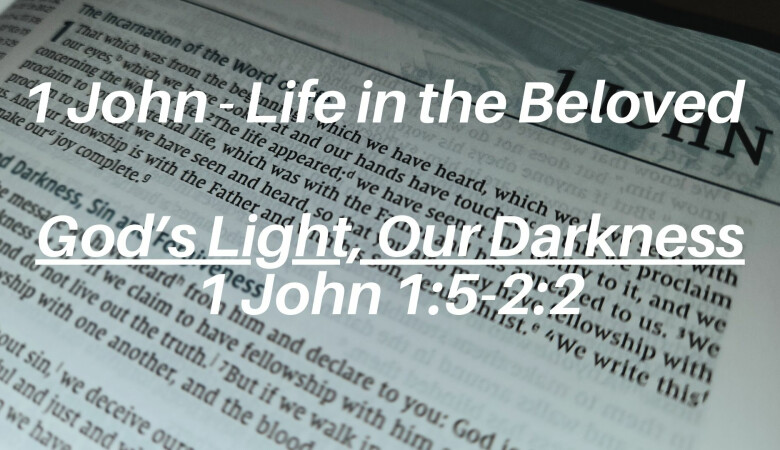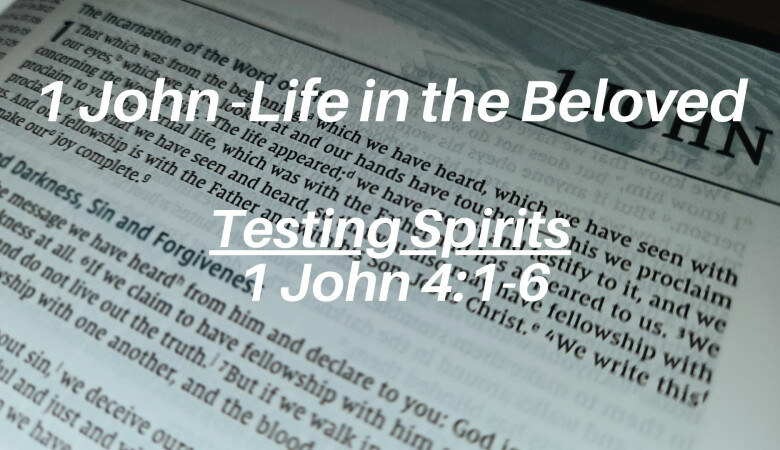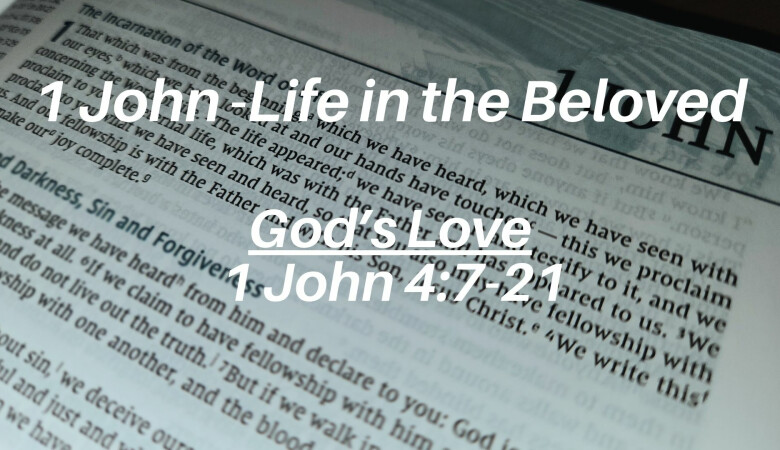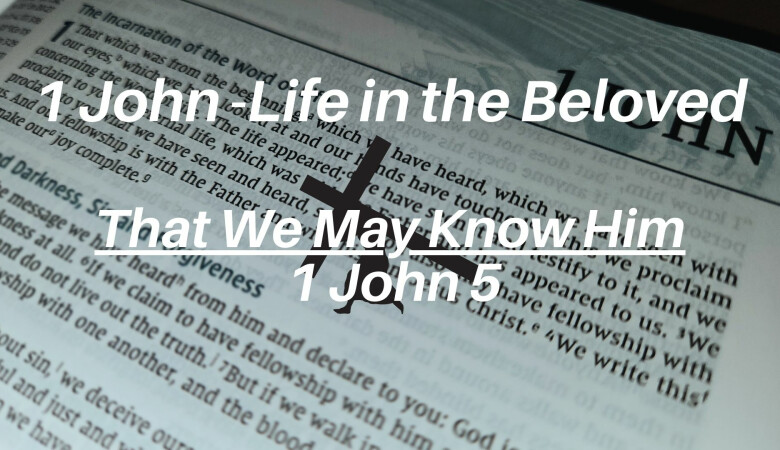Series: Life in the Beloved
The Mandate
October 01, 2023 | Peter Rowan
Passage: 1 John 2:3-14
ALL SERMONS IN SERIES
Summary
John began his first epistle with the declaration that the eternal has been manifest in the flesh in Christ and because of the incarnation we have fellowship with God and with one another. But sin breaks fellowship, so through the rest of 1 John chapter 1 he was addressing some errors of our understanding of sin - it's not a big deal, we don't really sin anyway, and God doesn't care about it too much. All of these are deceptions and he speaks to each one in order that we might test ourselves so that we would have fellowship with God and with one another. Well, John continues to address the issue of the revelation and fellowship of light and love through some tests - a moral test, a social test and a doctrinal test. John is intent all throughout to speak to temptations of his day to give up on some of these basics of the faith.
Transcript
The last house I lived in in college was the best. One of the housemates once wrote a musical - words, lyrics, music, all of it, that was performed for family and friends. We cleared out the living room and lined it with chairs and spent two weekends doing performances at night. Every Sunday night we would have our house meeting where we dealt with bills and whatnot, then we would either have a big wrestling match or go to the gym for basketball or volleyball or whatever, but ever week Sunday night was reserved to connect together. We brewed a lot of beer. In fact, two of the guys who lived in that house now have their own breweries. A few years back one of them won the award for best mid-size brewery in the country at the Great American Beer festival. A bunch of the guys volunteered with Young Life while the others of us were involved in a campus ministry, so we kept our beer fridge in the garage. We took turns brewing. And when the beer was brewing there was a good amount of down time. How we killed some of that time was by singing psalms and hymns. One of the Psalms we sang was Psalm 68, which was known as the Battle Hymn of the Reformation. It’s 12 verses long and each verse it two pages in a hymnal and takes a minute a verse. Psalm 117 is 2 verse long and takes about 8 second to read. I timed it.
A lot of times we sing hymns and those hymns tell a story, maybe like Psalm 104 and 105. They are a journey, a sequence of ideas that takes from one place to another and it is all pretty clear. You arrive at someplace and that someplace is different from where you started. Sometimes we sing short songs, little canticles, like Psalm 117. Like the kyrie, “Lord have mercy, lord have mercy”. One of the great modern places where we find these short songs are in the songs of the Taize community in France. We sing some of their songs throughout the year. Some tradition sing songs (and we do this sometimes) that are very repetitive. In sort of a derogatory way I used to call these songs “7/11” songs. Seven words, repeated 11 times. Psalm 136 is the great example of this. Every one of its 26 verse says “For his steadfast love endures forever.” 26 times! To some people old fashioned hymns - even if they help the times go by when you are brewing beer - are tedious and for others the refrains of newer songs are just repetitive. And many Christians just like to define ourselves and our proclivities and our preferences against others. We might benefit from leaning into a song that tells a story or another song that forces us to sit in a gospel truth enough that it comes close to us and begins to reveal something in us.
I’m not exactly sure why singing in the Bible is so different, but I am convinced that our Lord gave us his word because he loves us and he desires that we love him and love one another. Writing in the 4th century, St Jerome said, “The Scriptures are shallow enough for a babe to come and drink without fear or drowning and deep enough for a theologian to swim in with our ever touching the bottom.”
1 John (and in many ways the gospel of John) are a lot like a repetitive song. Paul’s letters (and Matthew and Mark and Luke’s gospels) are a lot like the old hymns. And if you are used to that kind of writing, well, John can be a bit frustrating. He doesn’t so much move in the A, B, C, D kind of fashion, but rather the A with a bit of B; then maybe A with some C and a little B still; then maybe A, B and C, but this time let’s add some D.
So, here’s what’s going on. 1 John I’ve said is addressing the fact that near the end of the 1st century some people are already giving up on some basics of the Christian faith. John just right in at the beginning of chapter 1 and says “The eternal is made flesh and because of that you have fellowship with God and one another.” Then he addresses the issue of sin by talking about light and darkness, but also by bringing in the subject of lying, lying to ourselves about our sin by diminishing it or thinking its just not there, or lying about God by saying that he doesn’t care much about it.
What we are seeing in this though is that there is a relationship between your life and God’s truth. Your fellowship with God and others is because of the incarnation, your engagement with light and darkness has everything to do with the fact that Christ is the propitiation, the atonement for your sin - they are such a big deal that God had to die for you that you would be redeemed, but he gladly did so.
Now, how do you know if these great truths of God have actually grabbed a hold of you?
Two weeks ago we saw some false claims about sin, but today we have two tests about. We have a moral test and a social test, the test of obedience and the test of love.
The test of obedience
Let’s read vv 3-6 again.
3 And by this we know that we have come to know him, if we keep his commandments. 4 Whoever says “I know him” but does not keep his commandments is a liar, and the truth is not in him, 5 but whoever keeps his word, in him truly the love of God is perfected. By this we may know that we are in him: 6 whoever says he abides in him ought to walk in the same way in which he walked.
Last time we saw that John gave us three “If anyone says….” This time he gives us two “By this we know…”
Look, Verse 3 “By this we know that we have come to know him.” Verse 5 “by this we know that we are in him.”
And again, I want you to think about what John is doing in this letter. There are those that are finding that the life of those around them is just maybe little easier and so they are giving up on Christian faith. Or, we have a very good sense that this is a big thing - they aren’t totally giving up, but they are giving up where Christian thinking or Christian life are just too hard because the world around them thinks it’s ridiculous. So, it would make a lot of sense to ask “How do I know if I know God?” or “How do I know that I am in God, have my life in him, as part of his life?” These are good questions and I hope they are questions you are asking and wrestling with.
The first answer that John gives to these questions is the answer of obedience. Do you keep his commandments? Do you walk in the same way in which he walked?
Can you say with the psalmist who wrote Psalm 119 things like this:
10 With my whole heart I seek you;
let me not wander from your commandments!
18 Open my eyes, that I may behold
wondrous things out of your law.
105 Your word is a lamp to my feet
and a light to my path.
Do you find that the desires of this world and of your flesh are more appealing to you that the commandments of God? Are you walking in his ways?
It’s a test. And it’s a good one. Because faith without works is dead faith. If your life would be the same as it is right now if you weren’t following Jesus, then it is simply worth asking whether or not you know him or that you find your life in him.
Now, there is a second test before us this morning,
The test of love
It may seem odd that John gives us the test of obedience first, but maybe it is so that we can properly hear the test of love.
When I say “love” you are tempted to think that what I am really saying is just “feeling of affection” or that someone finds someone else “sexually appealing”. You are tempted to think that it just has everything to do with what is going on inside of you, in your heart. It mostly just has to do with desire. “I love you” means “I desire you.” That’s partly why I can both say “I love my wife” and “I love bacon and donuts.” Both absolutely true statements, but they are only on the same plane if they are only speaking to desire.
Writing in Time magazine, the Rabbi David Wolpe said this in 2016:
It is time to change the meaning of the word “love.” The word is mostly used according to the first definition given in the dictionary: “an intense feeling of deep affection.” In other words, love is what one feels.
After years spent speaking with couples before, during and after marriage; and of talking to parents and children struggling with their relationships, I am convinced of the partiality of the definition. Love should be seen not as a feeling but as an enacted emotion. To love is to feel and act lovingly.
Too many women have told me, bruises visible on their faces, that the husbands who struck them love them. Since they see love as a feeling, the word hides the truth, which is that you do not love someone whom you repeatedly beat and abuse. You may have very strong feelings about them, you may even believe you cannot live without them, but you do not love them.
(“We Are Defining Love the Wrong Way”, Time Magazine, Feb 16, 2016)
Love takes on flesh
We were told in olden days way back in Leviticus and in Deuteronomy that we are not to hate our brother in our hearts, but that we are to love our neighbors as ourselves. Jesus actually sums up all of the law by telling us to Love God and love our neighbors as ourselves. It’s an old commandment. It’s no new commandment. But it is new.
Listen to verse 7-9 again:
7 Beloved, I am writing you no new commandment, but an old commandment that you had from the beginning. The old commandment is the word that you have heard. 8 At the same time, it is a new commandment that I am writing to you, which is true in him and in you, because the darkness is passing away and the true light is already shining.
Huh? What?
It’s old and it’s not new, but it is totally new?
Yes, that’s right.
Because we are tempted to downplay the fact that faith demands deeds. Faith without works is dead faith. Love only in your heart may not be love at all.
9 Whoever says he is in the light and hates his brother is still in darkness. 10 Whoever loves his brother abides in the light, and in him there is no cause for stumbling. 11 But whoever hates his brother is in the darkness and walks in the darkness, and does not know where he is going, because the darkness has blinded his eyes.
If a real test of faith is your posture towards the commandments of God (and specifically the real test is your posture towards the commandments or God that you really don’t like too much), well another test of true faith is your action towards the people that you live life in the flesh with. Do you act in love toward with one another. Do you harbor anger? Do you harbor bitterness? Does it find its way our in words of violence and unforgiveness? Does it works it’s way out through your hands and feet in movement of selfishness and greed? How do you live with one another?
And of course that is the ultimate test, because at the heart of Christian faith is Christ, God in the flesh. Not God feeling warm fuzzy thoughts towards his rebellious creation. Not God up in the sky just desiring to be near sinners who are running away from him. No, at the heart of Christian faith is a God who runs after us, who takes on flesh for us, who dies on a real cross and goes to a real grave and resurrects with a real body.
These tests of faith have everything to do with John’s point “A” - the eternal made flesh and his point “B” - life in the light. Life in the light is walking in the way of Jesus, which is walking in the light of love!
Now, I want to wrap up this sermon, but I need to talk about this whole family of God stuff, children and young men and fathers.
Listen again to this:
12 I am writing to you, little children,
because your sins are forgiven for his name’s sake.
13 I am writing to you, fathers,
because you know him who is from the beginning.
I am writing to you, young men,
because you have overcome the evil one.
I write to you, children,
because you know the Father.
14 I write to you, fathers,
because you know him who is from the beginning.
I write to you, young men,
because you are strong,
and the word of God abides in you,
and you have overcome the evil one.
How does this fit? Well, almost every commentator understands this as stages. Stages of the Christian life.
Children, you understand the forgiveness of sin and God as your Father.
Fathers in the faith, mothers in the faith, you know that he is from the beginning, that he holds all things to gather.
Young Men, Young women, you are in the thick of it. You’re experiencing some of the challenges of the evil one, persist.
And to all of us, know that you are in the community of the beloved. Walk as he walked. Delight in his word. Take on flesh with one another. Sing songs that might challenge our of love for one another.
Love makes people do crazy things. The stories we tell in literature and film are full of examples of the crazy things people will do for love. Love empowers Odysseus through madness and suffering, driving him desperately and longingly back toward home. Love makes James Potter stand in front of Voldemort’s killing curse to protect his wife and child, and gives his wife the courage to do the same. It sends Prince Phillip through a forest of thorns and into war with a dragon to rescue Sleeping Beauty.
It’s the motive behind a thousand songs and poems. It’s woven into the fabric of our universe because it’s reflective of the very heart of God. Love is what sends Jesus into the humble estate of Mary’s womb. It leads him through his quiet life, his rambunctious public ministry, and his agony at Golgotha.
Series Information

The book of 1 John is a letter from the last remaining apostle to group of house churches he oversees near Ephesus. It is a message of encouragement to saints who have grown weary with the unbelief of those around them. John writes to them and us as one who has known and been known by Jesus - and has found Jesus to be full of light, kindness and love.







